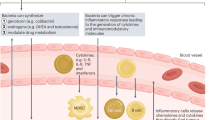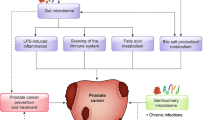Summary
The intestinal microbiome plays a significant role in modulation of the immune system and carcinogenesis. An increasing number of studies are now investigating the microbiome and the effect of dysbiosis on urological diseases.
Studies investigating the bacterial composition of urine and prostate tissue as well as fecal bacteria clearly demonstrated an association between the alteration in bacterial composition and prostate cancer. Furthermore, patients with and without prostate cancer seem to have a distinct cluster of bacteria that alter metabolic pathways including androgen and testosterone synthesis.
Apart from the interaction of the immune system and microbial composition, there is compelling evidence that the microbiome is involved in modulation of treatment efficacy. Therefore, a dysbiosis of the intestinal microbiome compromises the efficacy of PD-1 immunotherapy. Furthermore, androgen deprivation therapies (ADT), as well as androgen receptor targeting agents (ARTA) including bicalutamide, enzalutamide, and abiraterone acetate, seem to have an influence on the intestinal microbiome.
Microbiome research is a virgin soil in science and will provide further insights into a new area that affects the development of cancer. Based on this information, new therapeutic strategies and prevention options could be found in the future.
Similar content being viewed by others
References
Golombos DM, Ayangbesan A, O’Malley P, Lewicki P, Barlow L, Barbieri CE, et al. The role of gut microbiome in the pathogenesis of prostate cancer: a prospective, pilot study. Urology. 2018;111:122–8.
Nguyen DP, Li J, Tewari AK. Inflammation and prostate cancer: the role of interleukin 6 (IL-6). BJU Int. 2014;113(6):986–92.
Ruiz L, Delgado S, Ruas-Madiedo P, Sánchez B, Margolles A. Bifidobacteria and their molecular communication with the immune system. Front Microbiol. 2017;8:2345.
Bull MJ, Plummer NT. Part 1: the human gut Microbiome in health and disease. Integr Med (Encinitas). 2014;13(6):17–22.
Shrestha E, White JR, Yu S‑H, Kulac I, Ertunc O, De Marzo AM, et al. Profiling the urinary microbiome in men with positive versus negative biopsies for prostate cancer. J Urol. 2018;199(1):161–71.
Cavarretta I, Ferrarese R, Cazzaniga W, Saita D, Lucianò R, Ceresola ER, et al. The microbiome of the prostate tumor microenvironment. Eur Urol. 2017;72(4):625–31.
Bhatt AP, Redinbo MR, Bultman SJ. The role of the microbiome in cancer development and therapy. CA Cancer J Clin. 2017;67(4):326–44.
Wu X, Wu Y, He L, Wu L, Wang X, Liu Z. Effects of the intestinal microbial metabolite butyrate on the development of colorectal cancer. J Cancer. 2018;9(14):2510–7.
Liss MA, White JR, Goros M, Gelfond J, Leach R, Johnson-Pais T, et al. Metabolic biosynthesis pathways identified from fecal Microbiome associated with prostate cancer. Eur Urol. 2018;74(5):575. https://doi.org/10.1016/j.eururo.2018.06.033.
Markle JGM, Frank DN, Mortin-Toth S, Robertson CE, Feazel LM, Rolle-Kampczyk U, et al. Sex differences in the gut microbiome drive hormone-dependent regulation of autoimmunity. Science. 2013;339(6123):1084–8.
Neuman H, Debelius JW, Knight R, Koren O. Microbial endocrinology: the interplay between the microbiota and the endocrine system. FEMS Microbiol Rev. 2015;39(4):509–21.
Ridlon JM, Ikegawa S, Alves JMP, Zhou B, Kobayashi A, Iida T, et al. Clostridium scindens: a human gut microbe with a high potential to convert glucocorticoids into androgens. J Lipid Res. 2013;54(9):2437–49.
Routy B, Le Chatelier E, Derosa L, Duong CPM, Alou MT, Daillère R, et al. Gut microbiome influences efficacy of PD-1-based immunotherapy against epithelial tumors. Science. 2018;359(6371):91–7.
Sfanos KS, Markowski MC, Peiffer LB, Ernst SE, White JR, Pienta KJ, et al. Compositional differences in gastrointestinal microbiota in prostate cancer patients treated with androgen axis-targeted therapies. Prostate Cancer Prostatic Dis. 2018; https://doi.org/10.1038/s41391-018-0061-x.
Acknowledgements
The authors declare that they have no conflict of interest.
Author information
Authors and Affiliations
Corresponding author
Ethics declarations
Conflict of interest
C. Strasser, S. Graf, V. Tauber, and S. Krause declare that they have no competing interests.
Rights and permissions
About this article
Cite this article
Strasser, C., Graf, S., Tauber, V. et al. The microbiome of the prostate. memo 11, 294–296 (2018). https://doi.org/10.1007/s12254-018-0451-8
Received:
Accepted:
Published:
Issue Date:
DOI: https://doi.org/10.1007/s12254-018-0451-8




